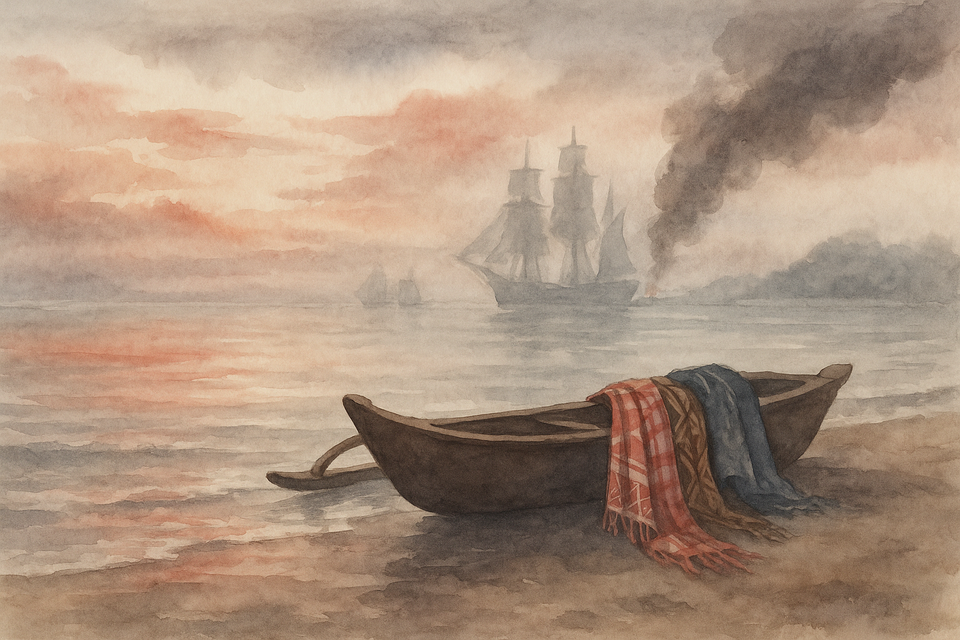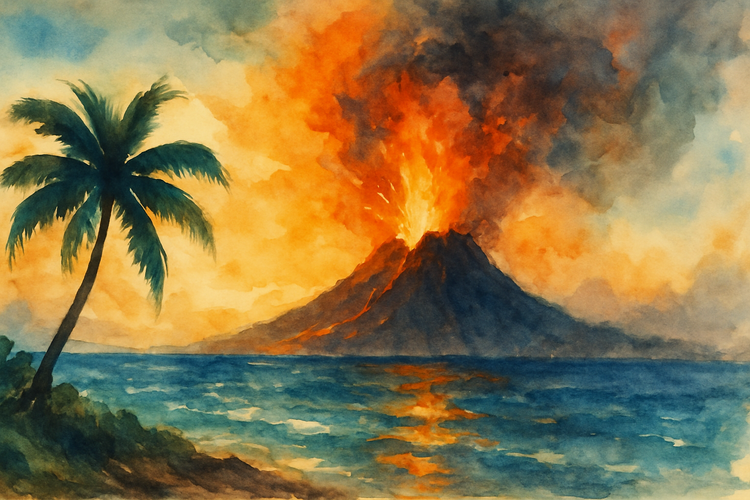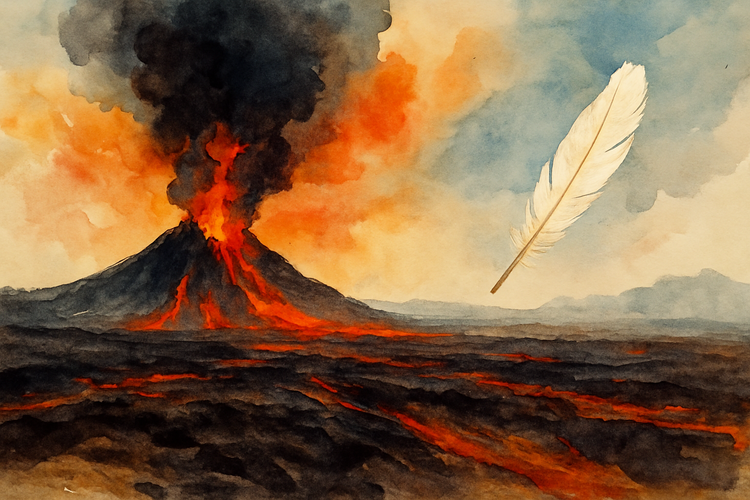Chief of War S1E7 "Day of Spilled Brains"

Spoiler Warning: This reflection reveals events from the seventh episode of Chief of War.
Foreign Sails on the Horizon
The seventh episode opens with a breach in the horizon: pale-skinned sailors stepping ashore, their presence both strange and unsettling. For Kamehameha, the moment calls forth his law of hospitality. He welcomes them as guests, declaring that no weapon will be raised against those who arrive in peace. It is an act of faith — not only in his own authority, but in the possibility that order and generosity can tame the chaos of encounter.
But even as he speaks, the intrusion reshapes the air around him. Memories of Cook’s bloody death linger in the collective mind, a reminder that outsiders bring danger as often as trade. Whispers of prophecy circle back — warnings that no chief, no matter how favored, can shield his people from every tide that breaks upon the shore. And beyond the rituals of greeting and gift, the episode frames the question that will haunt every scene: when the world arrives unbidden, will Hawai'i's laws prove to be protection, or only invitation?
Prophecy and Private Burdens
As the foreigners step ashore, Ka'ahumanu carries a more private burden. Just before her marriage to Kamehameha, she was told the prophecy that she would never bear him a child. The memory clings to her now, sharpening the tension of this moment. As the wife and consort of a rising chief, she already moves near the center of power, yet with that closeness comes doubt: if she cannot give Kamehameha an heir, what lasting role will she hold in shaping the kingdom’s future? The arrival of outsiders makes the question feel all the more pressing, for their intrusion is not only a threat to the islands but a reminder that every bond, even marriage, can be unsettled by forces beyond human control.
Beneath the surface of formal welcomes, Ka'iana moves in secret. He has a spy slip through the night to report on Keoua, only to hear that the rival chief is still out of reach. Each failed attempt deepens his conviction that Kamehameha is leaving himself exposed, blind to dangers gathering at the edges of the kingdom. In quiet exchanges with Ka'ahumanu, this obsession sharpens. She counsels caution, wary that Ka'iana’s hunger for confrontation may only hasten the ruin he fears, yet she also shares the weight of protecting Kamehameha from choices that could undo him. Together they hover at the edge of conspiracy — not to overthrow, but to guard a chief who may not fully see the peril. Their alliance is fragile, half-born of loyalty, half-born of restless desire to steer fate where prophecy has already sown doubt.
It is during one of these private councils that Ka'iana and Ka'ahumanu drift into play. He imitates the foreign manner of showing reverence — bowing and kissing her hand as if she were already a queen. At first it is a performance, a way of mocking or trying on the customs of the outsiders. Yet in the subcurrent it sharpens into something more serious. For Ka'ahumanu, the gesture awakens her own restless desire to alter the rules that bind her, a glimpse of the power she longs to wield openly. For Ka'iana, it becomes a half-confession, an intimacy layered atop his devotion to Kamehameha. What begins as mimicry of foreign ways turns into a moment of dangerous closeness. And though Kupuohi does not see it unfold, she feels the tension between them all the same, her jealousy rising against a bond she cannot name but cannot ignore. In the shadow of foreign sails, even imitation becomes revelation, unsettling both the bonds of marriage and the balance of loyalty.
Masks, Warnings, and Divisions Within
When the council gathers, the intrusion quickly sharpens into a choice. Kamehameha insists that the foreigners are guests, and that no weapon will be raised against them. To him, peace is not weakness but principle, a law strong enough to command even strangers. Ka'iana, however, cannot abide it. He recalls the bloody fate of Captain Cook and argues that only slaughter will protect the islands from further corruption. His words carry the weight of conviction — fed by spies, hardened by time abroad — but they also mark how far he has drifted from those around him. Where Kamehameha sees hospitality as strength, Ka'iana sees it as folly. The debate leaves the council taut with unease, the two men’s visions for Hawai'i set against one another: a kingdom rooted in law and restraint, or a kingdom shielded only by fear and steel.
Ka'iana does not let the council’s decision stand. Under cover of night, he joins Tony and his brother in a canoe, paddling toward the foreigners’ ship. What startles is his appearance — clad in western clothes, garments that signal how far he has traveled and how much he has changed. At one level, they serve as a tool, a way to move between worlds. But more deeply, they are an outward sign of the imprint his time abroad has left upon him, a reminder that he no longer fully belongs to either shore. The image recalls his journey in City of Flowers, Part II (S1E4), where his time abroad first began to mark him with the imprint of outsiders. On the water, he embodies the very division tearing at the islands, a chief who fights to protect Hawai'i while carrying the marks of the outsiders he despises. The mission is cut short when Kamehameha intercepts him, forcing Ka'iana back to shore. What lingers is not the failed attempt, but the sight of him in foreign dress — a man altered, even as he still claims to defend his people.
When Ka'iana learns that his mission has been exposed, his fury turns on Kupuohi — it was she who told Kamehameha. Their confrontation is laced with jealousy and bitterness, but also with a truth Ka'iana cannot dismiss. She tells him that the foreigners do not need to be present in the flesh to corrupt the islands. Their language is already spoken, their weapons already wielded. The danger is not only the cannon fire that may come from beyond the horizon, but the subtler shift already taking place within. Ka'iana’s western clothes have made that truth visible: he carries the imprint of outsiders even as he rails against them. Kupuohi’s words strike at the heart of his contradiction, exposing how intrusion has already seeped into their lives, not as invaders at the gate but as fractures within the household itself.
Fire on the Shoreline
When John Young delivers Kamehameha’s command that the foreigners must depart, it seems for a moment that the storm may pass. But the sails linger on the horizon, unmoved by law or courtesy. Their refusal is quiet, almost casual, yet it carries the weight of doom. For all of Kamehameha’s declarations, the law of hospitality falters against the logic of empire: guests who will not leave are not guests at all.
Instead of withdrawing, the foreigners strike. Another village becomes the target, its people caught off guard by an assault they did not invite, cannot withstand. The intrusion that began as an uneasy welcome now reveals its true shape: conquest disguised as encounter. The laws of peace mean nothing to men who measure value in plunder and dominance.
On the shoreline, Taula convulses. Her fit comes not as vision alone but as embodiment — the land and spirit themselves recoiling at what unfolds. We have seen her before at moments of prophecy twisted or protection broken, and here she appears again, a living reminder that the sacred cannot be severed from the fate of the people. Her body speaks the warning that words cannot carry: doom has crossed the threshold.
Then comes the roar. Cannon fire tears into the village, a violence the islands have never known in this form. The sound is not only destruction but revelation — proof that the world beyond the horizon has brought weapons capable of shattering both walls and certainty. Flames rise, smoke curls skyward, and the air fills with the cries of those who believed themselves shielded by law, kinship, and sea. In this moment, foreign intrusion ceases to be debate or prophecy. It is devastation written in fire and iron.
Conclusion — When the World Breaks In
Day of Spilled Brains closes with the shattering truth that intrusion is not a question of if, but when. Kamehameha’s law of hospitality is tested against cannon fire and found fragile, not because it lacked wisdom, but because the world beyond Hawai'i does not honor the same codes. Ka'iana, clothed in western garments, fights to defend his people even as he carries the mark of those he despises, proof that the foreign presence has already altered him. Ka'ahumanu stands between prophecy and ambition, wrestling with what her place will be if she cannot give an heir, her desire for agency stirred in moments she cannot fully control. And on the shoreline, Taula convulses — the spirit of the islands themselves crying out that protection has failed. Together these threads reveal intrusion not only as an external danger but as a force that unsettles every bond, every law, every prophecy — echoing back to Changing Tides (S1E2), when Taula first appeared as a sign that prophecy was already twisting beneath the surface. What began with sails on the horizon ends with fire in the villages, leaving Hawai'i’s leaders to reckon with a truth they can no longer ignore: the world has broken in, and nothing will remain untouched.



Comments ()